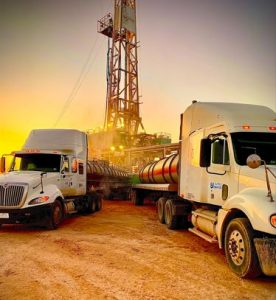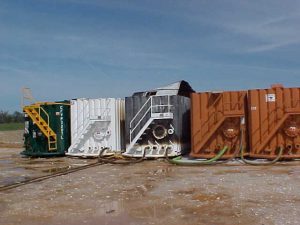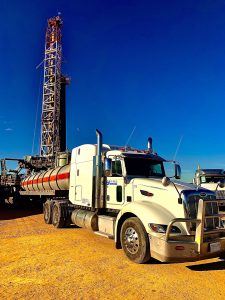by Paul Wiseman
Like everyone in the industry, the oilfield services sector has ridden waves of change over the last three years. Some companies, like EV Oilfield Services, actually expanded during the Pandemic. Others, like Florida-based Lightning Master, weathered the storm and has grown significantly since then.
Pandemic? What Pandemic?
EV Oilfield Services, based in Midland, specializes in the “dirty work” of tank cleaning, site and equipment cleanups, and other onsite work. While their biggest operations are in the Permian, they also have clients in Pennsylvania, Ohio, West Virginia, New Mexico, Louisiana, Colorado, and elsewhere in Texas. Company Vice President Jeremy Sanchez says 2020 was actually one of their best years.
EV’s client list reads like a who’s who of the top majors and large independents—and “all these guys shut down hundreds of rigs” in 2020. “That whole time they’re shutting these rigs down, they still had to call us to clean them and maintenance them. So, while everybody else is pulling all their equipment offsite, we’re taking stuff out there to maintenance all these things,” he said. Noting that it was indeed a bittersweet season, EV Oilfield Services was in the right sector at the right time.
Versatility, both in types of work and in locations across seven states, helped them stay busy. “We’re on the drilling side, the completion, side and the production side, so we can jump around and be successful through ups and downs—and we’ve only been in business 10 years, but I’ve still seen, like, three booms and busts.”
One might think that the downturn would have given the company a larger hiring pool. And while that was somewhat true, Sanchez found that this “down and dirty” cleaning work was not for everyone, no matter the tightness of the job market. Many of the seekers came from supervisory office positions and “were high-end candidates, but they didn’t want to do the work. I want the guy that doesn’t like to talk, he just wants to put his head down and grind.”
Sanchez continued, “You can’t train what we do—either you work hard or you don’t.” There may be remote working options for engineers, but that’s not in the cards for truck drivers or rig cleaning hands. “To actually make this stuff turn right, you’ve got to put your hands on it.”
As you may have noticed by now, Sanchez is frustrated with today’s job applicants. “People are afraid to get dirty. That’s just a generational thing,” he said. Sanchez admits to being just 30 himself, but “I grew up different.”
Knuckle-busting work is indeed no stranger to Sanchez. Ten years ago the company began with “me and my pops and a $150 power washer. Now we’ve got almost 200 employees, 80 semi-trucks, and at least $30 million in equipment.” And they do business in seven states. Sanchez said the company has about 70 CDL (commercial drivers’ license) drivers and 60 field hands in their work force.
The man he calls “Pops” is his father, Eric, and his grandfather is Ventura (the letters E and V in the company name). Ventura gave son and grandson $5,000 to start the business.
Coping with Change
Pay raises, passed on in higher costs to customers, have been the order of the day for the last two years. After taking a 15-20 percent price hit during COVID, Sanchez says his prices, payrolls, and margins are all higher than ever, due to the fact that producers realize they must meet market demands. “We’re up, I’d say, 28-30 percent over a year ago, just in pricing—and that was post-COVID. These operators have to pay it because there’s just no work force.”
At one point in the interview Sanchez insisted he was not really into studying trends or worrying about international politics. But he offered a simple assessment of the foibles of the current market that reveals some thought. “I feel like that whole COVID stimulus stuff, it just made people lazier. I think that’s a bigger threat than any kind of foreign threats. If you can’t get anybody here in the states to work for you, it doesn’t really matter what else is going on in the world.”
Lightning Master Strikes Again
Lightning Master began serving clients in the Permian Basin in 2010, and opened their first office there in 2016. After starting well, the downturn and some price-cutting competition hurt the company’s business around 2020. Now the Permian is producing more oil than ever, the competition has diminished, and customers are again ringing the phones, seeking protection from lightning and other forms of ignition-causing static.

EV Oilfield Services got its start ten years ago with a father-and-son team and a $5,000 investment.
Lightning and static protection are sometimes a forgotten factor in site construction, until either of two emergencies occurs: there’s a lightning strike; or the insurance company won’t certify the site unless lightning protection is in place. Both can generate panicked calls to Lightning Master, said the company’s founder and President, Bruce Kaiser. “A lot of those customers come to us at the last minute because they built the site—then they realized they can’t get insurance on it until they have lightning protection on it. They come running to us at the last second, like, ‘Can you be here later this afternoon to do the installation?’ and the correct answer to that question is, ‘No.’”
Or, said the company’s Chief Operating Office, Lindsey Coghlan, “They’re waiting for a lightning strike to happen or to have a tank to blow up” before they realize the need and make the call. While Lightning Master is happy to do everything they can to expedite such calls, it does create challenges in planning a work schedule, she added. The company designs each installation to meet the needs of the site, so a proper installation requires time for the design and the work—and making sure all parts are in stock due to supply chain issues.
There are a few pro-active companies, including midstreams and some larger independent producers, who allow for timely planning and scheduling.
Kaiser noted that the new oilfield reality, where producers hold onto assets rather than initiating and selling, has created a different mindset in their spending. Because Lightning Master is a premium supplier, this sea change has helped get new clients and return previously price-driven ones back into the fold.
“They’re willing to spend more money now,” he observed. “Back in the old days it was just price, price, price, because they were going to sell the tanks to somebody else. They just wanted to get it into service. But now that they’re keeping the sites, they’re willing to spend more money to get the quality.”
Lightning Isn’t the Only Issue
As dramatic and occasional as lightning is—basically a gigantic static discharge from cloud to ground—it’s hardly the only source of static at a well or tank site. “With production tanks,” said Kaiser, “sometimes it’s just normal tank operations. If you go a high production facility and you stand next to the tank, you can hear the tank thrumming as the produced water is running through it.”
When produced water enters the tank, that releases the pressure, letting the trapped gas effervesce out into the air. Effervescing action creates static, and “those effervescing bubbles are full of gas,” which is highly flammable.
The biggest problem comes as a producer begins to fill a previously empty tank, because at that point the tank contains mostly air. “That’s when you’re likely to have ignition,” Kaiser said. Flowback tanks see basically the same risk factors.
 Improper gas venting is another dangerous situation. A vent that is not attached to a vapor recovery unit (VRU) is vulnerable to any nearby arcing around the thief hatch, Coghlan added. Kaiser said venting problems they’ve seen include a simple 4-inch threaded hole; a 4-inch hole with a 3-4 foot standpipe screwed into it; a series of standpipes connected by a manifold that delivered the gas to a flare; “and the best would be where you have the standpipes going into a manifold running into a VRU,” Kaiser explained.
Improper gas venting is another dangerous situation. A vent that is not attached to a vapor recovery unit (VRU) is vulnerable to any nearby arcing around the thief hatch, Coghlan added. Kaiser said venting problems they’ve seen include a simple 4-inch threaded hole; a 4-inch hole with a 3-4 foot standpipe screwed into it; a series of standpipes connected by a manifold that delivered the gas to a flare; “and the best would be where you have the standpipes going into a manifold running into a VRU,” Kaiser explained.
Yearly inspections are a key part of protection. Over time, things change at a site: tanks are added or moved, lightning protection may be disconnected for tank maintenance, then not reconnected, piping may be added or moved. Any source of static that is left out of the system can create a problem.
Overall, Kaiser and Coghlan see improvement in this area. “Everybody’s getting better because they have to,” said Kaiser. “You can’t afford to be losing too many sites.” One reason for the “have to” is that more and more drilling is happening in populated areas. When sites were miles from civilization, an explosion and fire might be undetected for days, with no one hurt in the process.
Lightning Master also spends time educating clients on the best protection design and on how to keep it intact.











